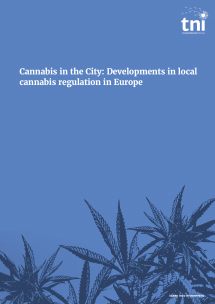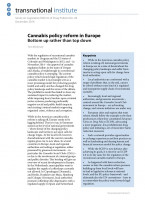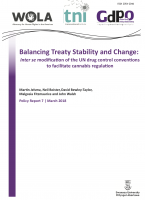Cannabis in the City: Developments in local cannabis regulation in Europe
In order to better understand the situation around, and possibilities for, local and regional cannabis regulation, a series of six country reports were developed. The country reports provide detailed information about the state of cannabis policy, and the possibilities for change, within each country. This Report summarises some of the key findings from the research and explores opportunities, obstacles, and strategies for cannabis regulation at the municipal and regional level.

Downloads
Authors

This paper examines six European countries – Belgium, Denmark, Germany, the Netherlands, Spain and Switzerland – in order to better understand the tools being used – and the challenges faced – by municipal and regional governments calling for different cannabis policies. Although the national contexts, histories, legislation, state structures, and social contexts of these countries vary significantly, there are important lessons to be learned by comparing different approaches. This paper draws on Country Reports (published separately) which were written by researchers within each country, which offer a more detailed exploration of the respective reform efforts, as well as of the national political and policy environment.
The picture that emerges from this research is one of municipalities and regions struggling within restrictive policy frameworks. This report opens with a discussion of the combined challenges that have created the current impasse in cannabis regulation at the UN, European Union (EU), and national level. This is followed by a short introduction to the history and context of cannabis regulation and reform in each of the six countries, and some of the research findings. In short, we have identified two primary routes to reform which are currently being pursued by regional or municipal governments in the six countries. Although government actors may try to make direct changes to national drug law, there are a number of spaces where they may, either autonomously or with the support of national governments, make direct changes to drug policy without major changes to national law. We will explore the ways in which government actors are pursuing these strategies in two sections, and touch briefly on the role of non-government actors including law courts and civil society in changing cannabis law and policy. We conclude with a discussion of a policy framework – multi-level governance (MLG) – which might help to mediate the complex relationship between the international and municipal levels of cannabis policy, with a focus on breaking the impasse in national and EU-level reform. Finally, in light of this research, we suggest a few findings and observations which may be of use to local authorities struggling to develop more locally adapted policies.
Produced as part of a the "New Approaches in Harm Reduction Policies and Practices" project.
This project has been funded with support from the European Commission. The publications reflect the views only of the authors, and the European Commission cannot be held responsible for any use which may be made of the information contained therein.








